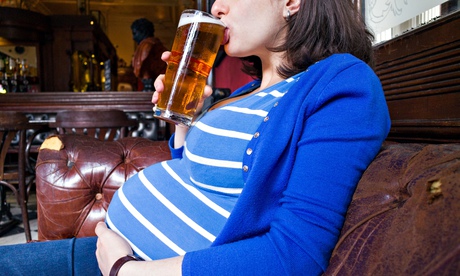
Margaret Atwood’s 1985 novel The Handmaid’s Tale seems to have moved from fiction to prophecy, with news of a court case in England that could lead to the prosecution of women who drink alcohol while pregnant.
“Nothing changes instantaneously,” wrote Atwood, “in a gradually heating bathtub, you’d be boiled to death before you knew it.” She was referring to the gradual deterioration of an imagined liberal society where an increasingly draconian state imposes laws on women’s sexual, reproductive and basic human freedoms. Her prescience was startling.
To make criminals of pregnant women has the potential to lead to such worrying consequences that Birthrights – the human rights in childbirth charity that I co-chair – and the British Pregnancy Advisory Service (Bpas) have applied to intervene in the legal process.
The case, which is largely concerned with moving money from one public pot to another, rests on proving that a mother’s drinking in pregnancy caused criminal harm to her unborn foetus. Despite increasingly prescriptive official guidance about avoiding alcohol when pregnant, the evidence base on this subject is patchy at best. As Dr Ellie Lee, director of the Centre for Parenting Culture Studies, explains: “It is remarkable that these approaches have gained such a hold. What has come to count is not evidence about the effects of drinking, but rather the absence of it. Since it is not known whether drinking certain amounts of alcohol in pregnancy is harmful, it is seen as better to act as though it might be. What is known is that there is an association between drinking a great deal and a specific set of birth defects, but since not all babies born to alcoholic women have these defects there is more to it than alcohol as a substance – for example, nutrition and general health.”
Whether or not you accept the shaky science, it is hard to see how punitive measures help women or babies, particularly those in the most vulnerable groups who inevitably become the target for sanctions. Clare Murphy, director of external affairs at Bpas, points out that becoming pregnant doesn’t suddenly change the context of a woman’s life, and the challenges or addictions she might long have struggled with. Threatening these women with criminal sanctions is not the marker of a civilised society, she adds.
But it’s not the junk science or indeed the lazy, punitive approach to dealing with a complex social issue that concerns me most. To those of us who work to protect women’s freedoms this case feels like the early days of The Handmaid’s Tale: the temperature in the bathtub is rising swiftly and silently.
We can look to the US for an example of what happens when pregnancy is positioned as a sub-human state in which a woman must accept that her basic rights are sacrificed for, or set in competition with, her foetus. There is no evidence from the US that the rising trend for punitive approaches to public health have had any positive effect, says Elizabeth Armstrong professor of sociology and public affairs at Princeton University.
A 2013 study by Lynn Paltrow, founder of National Advocates for Pregnant Women, charts the consequences of the US legal system’s separation of foetal and maternal rights. She details hundreds of legal proceedings in which a woman’s pregnancy was the central factor in restricting her freedom. From a forced caesarean that led to the death of a cancer-patient mother, to a prison sentence for homicide handed out to a woman who attempted suicide while pregnant, Paltrow’s work charts a rightwing tightening of the harness around women’s uteruses that extends as far as giving the unfertilised eggs in their bodies separate legal status. This is a world in which, according to Paltrow, “what is being criminalised is not just the ‘action’ or ‘behaviour’ it is the pregnancy as well. In other words – but for being pregnant – there would be no criminal or civil liability.”
Much of the push to recategorise pregnant women’s humanity stems, of course, from the aggressive US anti-abortion agenda. It is a neat and persuasive way for the anti-abortion movement to legitimise a rhetoric that uses the presumption of foetal rights to push women down the hierarchy and into line. As Paltrow explains: “So-called pro-life measures are being used in ways that not only violate women’s reproductive rights, but create the basis for depriving them of their constitutional personhood and human rights.”
While it may be easy to cast women who drink in pregnancy as villains, criminalising them does no one any favours, save for those with a broader anti-women agenda. Atwood may be right that “nothing changes instantaneously”. But if this case succeeds in setting a legal precedent in the UK, pushing pregnant women into a new and inferior category, it will be a big leap towards our own dystopia, with serious implications for us all.

